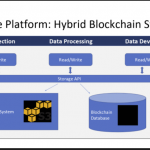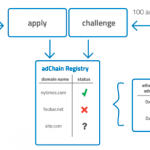Why An Alum Of Both Gawker And The Awl Is Pivoting To The Blockchain
February 28, 2018
Last year began what could only be described as a time of reckoning for the media industry. It certainly seems to be continuing this year. With the digital ad space being constantly squeezed by the ever-growing market share of Facebook and Google, the journalism business model has been in crisis. Big organizations–like BuzzFeed, Vice, and Vox Media–have faltered because of these shifts, while smaller companies–like Little Things and The Awl–have outright shut down.
Potential solutions abound. One buzzword of late is subscriptions (and therefore paywalls), and indeed we’re seeing a bunch of publications shift their once ad-reliant business to new revenue streams that ask readers to pay. (Will they? Who knows!)
Other yet-to-be-proven ideas have been thrown around, too, including the jargon-y concept of “the blockchain,” which would let users pay for journalism via blockchain-based digital currency. While it may be experimental, given the scarcity of workable models out there, some media veterans are giving it a try.
Tom Scocca, an alum of both Gawker and The Awl, announced today that he is launching a new media project called Hmm Daily (which is easy to read but, as it turns out, very awkward to say out loud). According to its website, Hmm‘s mission is to “write and publish things that people can’t get anywhere else.” It sounds an awful lot like both Gawker and The Awl, which is heartening to say the least–given that the demise of both sites has created an utter void in the internet.
The project uses a new platform called Civil, which is described as a “decentralized marketplace for journalism.” It’s built atop the Ethereum blockchain, and will issue its own token, which will in turn be a way for its users to fund the projects they wish to read.
I’m still a bit foggy on exactly how it will work, so I called up Scocca to hear his thoughts. Scocca assures me that “the basic product is going to be a recognizable publication,” so that’s good. He sees Hmm as continuing his own personal journalistic mission: “finding ways for people to do things they couldn’t otherwise do.” His prior efforts to propel this ethos have certainly seen setbacks: Gawker shuttered in 2016 because of a lawsuit funded by Peter Thiel, while The Awl closed earlier this year because it couldn’t sustain itself on advertising.
According to Scocca, Civil “seemed like a good thing to try,” though he admits, “I don’t know if I understand it more than halfway myself.”
Permanent Record
Ultimately, what Civil does is provide a content management system (CMS) that Hmm can use, which is a software for writers to publish their stories online. What makes the blockchain so enticing, from a journalistic perspective, is that it creates a theoretically permanent ledger of every transaction. In media terms, that means an un-deleteable revision history. So it reduces the likelihood of, say, a vengeful billionaire trying to erase an entire publication’s history.
As for the currency end, Civil essentially provides a way for users to buy coins and invest them in the journalism they wish to read–it’s pretty much subscriptions but with a new payment layer. Civil will have tokens that users can put toward projects. “The tokens move around and then can be exchanged for U.S. dollars as needed,” explains Scocca. He adds, “One hopes that they appreciate in value.”
The specifics are still being worked out, but Scocca says the site will likely include a mix of both free and subscription-based content.
Both of those elements present potential antidotes to things that have historically failed media companies. “I talk about coming to this from working at Gawker and being a contributor to The Awl,” says Scocca. “Each of those suffered its own fate because of two different aspects.” Namely, a malicious billionaire and the crippled digital ad space.
Of course, it’s unclear how it will play out. Scocca knows that too–he’s still trying to visualize how the whole cryptocurrency part of it will work. But old strategies have fallen behind, and programs like Civil offer at least “the possibility of having a new financial model.”
The hope is for Hmm to go live sometime in April, once Civil and its concomitant token officially launch. Then we’ll get a better sense of what both will look like. For now, you can add your email to receive updates.
“The blockchain talk makes it sound like some weird incomprehensible alien species,” says Scocca. “From our end, it’s going to be a CMS, and from the readers’ end, it’s going to be a website. In between, there’s magic happening.” I hope.
(29)














